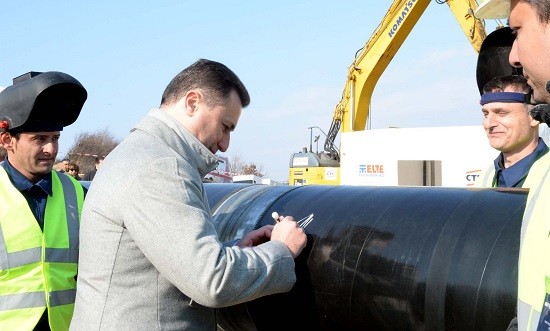Nobody took a look at what’s behind Stroytransgaz and Timchenko
Published in Analyses
on 10 - 08 - 2016 Author: Борис Камчев
- Another signature for a deal with Russian company owned by people under Western sanctions. Photo: Ministry of Finance
The absence of basic analysis in the Macedonian media (with rare exceptions) about the construction of the gas pipeline Klechovce – Negotino, carried out by a Russian company whose majority shareholder is under Western sanctions, leads to publishing only superlatives without digging under the surface and without making attempt to disclose whether this deal conceals something unknown to the Macedonian public, which otherwise should be known
Author: Boris Kamchev from Sankt Petersburg
Gazprom’s effective managers, who have been boosting the Russian economy for two decades, decided to boost the Macedonian economy as well by constructing a gas pipeline in Macedonia. Last week, after several media pompously announced the finish of the construction of the first section of the gas pipeline (Klechovce – Negotino), made us point out to several important moments regarding the main contractor, Stroytransgaz and Gennady Timchenko, owner of the company’s control package of shares.
With the beginning of the construction of this gas pipeline section in March last year and with the finishing of the construction works last week, the Macedonian media (with rare exceptions) have been publishing neutral and purely informative articles, without any critically-oriented analysis regarding what actually this Russian company represents. Stroytransgaz is on the blacklist of the US Department of Treasury due to the Russian annexation of Crimea and Moscow’s actions in Ukraine, whereas the Finnish citizen Timchenko is on the sanction list of several western countries such as the USA, Australia and Canada.
And besides all of this, some Macedonian media write praising articles: “New history in the Macedonian infrastructural energy map: The Russian company Stroytransgaz is working with full steam ahead on this section of the gas pipeline network”.
First, the draftsmanship and the construction works are given to Gazprom’s former firm, highly active contractor of the Russian monopoly, owned by Timchenko, who was one of the first persons on the sanction lists in 2014 due to his closeness with Vladimir Putin. Timchenko is also known as the person in charge of filling the President’s wallet.
Of course, by following the working model of this and the other privileged contractors of state infrastructural projects in Russia, our government awarded the construction of the gas pipeline to Timchenko without tender, whereas the money is non-transparently spent and with no accountability in front of the public. “Ochen kruto”, the Russians say.
None of the Macedonian media, except the website Nova TV, published a thorough analysis about this fact. They could have at least mention that a major project like this cannot be given to a suspicious contractor without passing the procedure called tender. And third, which is rather confusing, some media announced the gas pipeline as Klechovce – Negotino and that it will cost $75.7 million, whereas the same gas pipeline in those same articles is referred to as “Klechovce – Block station 5”. Absolutely none of the media mentioned that there is a discrepancy in the nomenclature of the gas pipeline with the actual territory where it is stretched, which is around 30 kilometers shorter. Or this section from the gas pipeline should be named as “Klechovce – Shtip”. Obviously, government’s propaganda motives are concealed behind all of this.
WHO ARE TIMCHENKO AND THE ROTENBERGS?
In 2014, the revenues of the then largest contractor of Gazprom, Stroygazmontazh, a company owned by Arkady Rotenberg, Putin’s judo sparring partner, were $3.5 billion with $227 million profit. Known as the “kings of state orders”, the brothers Boris and Arkady Rotenberg are close cooperators of Putin, and no. 2 President’s wallet-fillers right after Timchenko. In 2014, the revenues of Stroytransgaz were smaller, $1.4 billion, and had $60 million profit.
In 2014 and 2015, the two companies were awarded the exclusive right to participate in the construction of the most significant infrastructural projects in Russia in the upcoming period. In 2015, Stroytransgaz was lucky to participate in the construction of “Power of Siberia”, $70 billion gas pipeline mega project financed by China. On the other hand, Rotenberg got the blessing from Kremlin for construction of the 20-kilometer bridge over the Kerch Strait that will connect Crimea with Russia. This project’s value is $3 billion.
In 2014, the two privileged contractors gained control over Stroygazconsulting, whose former owner, Ziyad Manasir, fell into disfavor with Gazprom (Putin). The saga with Crimea and the war in Eastern Ukraine consolidated the Russian elite, whereas the revenues from the state tenders and orders ended directly in companies and business-circles close to Kremlin. Some of boss’s closest people are Timchenko and the Rotenberg brothers.
Nevertheless, he alongside with the trading company Gunvor covered probably 50% of the Russian sea crude oil export in some moments from the first decade of the new millennium. In 2012, The Economist accused Timchenko of insider operations and manipulations with the price of the Siberian oil “Urals” with the aim of gaining illegal profits. Prior the sanctions in 2014, afraid that his bank accounts with billions of dollars will be frozen, Timchenko sold his 44% shares from Gunvor.
It is clear that these companies unjustifiably gain tenders and are given exclusive offers for participation in significant infrastructural projects in Russia worth tens of billions of dollars. They are actually the base of the Russian general corruption, worth $300 billion. And when the western governments, the international markets and financial institutions raised the embargo, our government, either because of lack of knowledge or because of a plan (I want to believe in the first one) with no moral responsibility or whatsoever, welcomed them and invited them to operate on our territory.
Nonetheless, with the construction of the gas pipeline, Russia is paying back the clearing debt to Macedonia worth $60 million. Macedonia inherited a part of the $806 million clearing debt which the USSR (Russia) was paying back to the former Yugoslavia and is also the last from the former federal republics that is still regulating that debt. But, it is quite confusing that the Russian debt is paid in the form of a gas pipeline constructed by a contractor which is on sanction lists of numerous foreign countries due to the Russian annexation of Crimea and Moscow’s war engagement in Ukraine.
THE CROATIAN EXAMPLE
Were there any chances of obtaining an agreement like the one Croatia reached? In 2006, Zagreb received oil, military helicopters and construction of a power plant in total amount of $108 million from Moscow. All right, having in mind the current geopolitical situation and the tensions between the West and Russia, our government could have selected a neutral variant. The three Macedonian power plants, TEC Negotino, REK Bitola and REK Oslomej were built in the ‘70s with Russian machinery and equipment and were monitored by Russian technicians, specialists and engineers, and many of them stayed in Macedonia. Why our government didn’t obtain an agreement, for example, for long-term maintenance and repair of the operative blocks of the three power plants with Russian money, until there is money left from the debt?
And now, for around $60 million (though the government has spent 10 times more for “Skopje 2014”) we are on the mat of the international public as cooperators of Gazprom. A company that the Bulgarians literally swept from their yard by stopping the realization of the South Stream gas pipeline, a project forbidden by Brussels due to the flagrant disrespect of the anti-monopoly laws of the EU (Third Energy Package). We are in the spotlight of the pages and screens of Putin’s propaganda as an important polygon for practicing the Russian hybrid foreign policy, complex of military engagements, venomous TV propaganda, hacking, trolling and polluting the social media space. In a nutshell, Macedonia became the Balkan currency for filling Kremlin’s wallet.
INDICATIONS FOR CORRUPTION
When it comes to money, the Russian media published (and ours are wisely mute about this) that Stroytransgaz has spent $1.24 million per one kilometer of the Klechovce – Shtip gas pipeline. Naftegaz writes:
“Stroytransgaz has inexpensively completed a section of the Klechovce – Negotino gas pipeline. The construction of the 61-kilometer long, 508 millimeters in diameter section costed $1.24 million (per kilometer)”,
and then sarcastically asks:
“Probably because the soil in Europe in softer or the construction is simpler, but that is less than the average $1.5 million per kilometer”.
Stroytransgaz confirmed for the Media Fact Checking Service that (for a sum of $75.7 million) they have done the following:
- draftsmanship and geodesy;
- installation of technical equipment and materials;
- construction of the main pipeline from 0 to 61 km, section “Klechovce – tap station VS 5” with transmission pipelines, 7 tap stations, pigging facilities;
- construction of the cathodic protection system (3 stations);
- HDPE pipes for optic fiber cable;
- montage of 22 road, highway and waterbody crossings.
Last year, it was announced that this sum would cover the construction of the gas pipeline to Negotino in order to connect TEC Negotino to the gas pipeline network (the power plant has dual production block, it runs on mazut and gas). Hence the question: why the entire section to Negotino is not completed for the sum of $76 million, as it was announced in March last year?
This question is completely legitimate when doing business with companies and persons under the wing of Kremlin. According to the Russian National Rating of Transparency in Procurement, only in 2015 the country has lost nearly $4 billion due to procurement and commerce with high-figure prices. According to the National Anti-Corruption Committee, the entire amount of corruption in Russia is unbelievable $300 billion per year, and is 30 times bigger than the narcotics market in the country.

